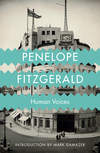Loe raamatut: «Human Voices»
Human Voices
PENELOPE FITZGERALD

Contents
Cover
Title Page
Preface by Hermione Lee, Advisory Editor
Introduction
1
2
3
4
5
6
7
8
9
10
11
12
Other Works
Copyright
About the Publisher
Preface by Hermione Lee, Advisory Editor
When Penelope Fitzgerald unexpectedly won the Booker Prize with Offshore, in 1979, at the age of sixty-three, she said to her friends: ‘I knew I was an outsider.’ The people she wrote about in her novels and biographies were outsiders, too: misfits, romantic artists, hopeful failures, misunderstood lovers, orphans and oddities. She was drawn to unsettled characters who lived on the edges. She wrote about the vulnerable and the unprivileged, children, women trying to cope on their own, gentle, muddled, unsuccessful men. Her view of the world was that it divided into ‘exterminators’ and ‘exterminatees’. She would say: ‘I am drawn to people who seem to have been born defeated or even profoundly lost.’ She was a humorous writer with a tragic sense of life.
Outsiders in literature were close to her heart, too. She was fond of underrated, idiosyncratic writers with distinctive voices, like the novelist J. L. Carr, or Harold Monro of the Poetry Bookshop, or the remarkable and tragic poet Charlotte Mew. The publisher Virago’s enterprise of bringing neglected women writers back to life appealed to her, and under their imprint she championed the nineteenth-century novelist Margaret Oliphant. She enjoyed eccentrics like Stevie Smith. She liked writers, and people, who stood at an odd angle to the world. The child of an unusual, literary, middle-class English family, she inherited the Evangelical principles of her bishop grandfathers and the qualities of her Knox father and uncles: integrity, austerity, understatement, brilliance and a laconic, wry sense of humour.
She did not expect success, though she knew her own worth. Her writing career was not a usual one. She began publishing late in her life, around sixty, and in twenty years she published nine novels, three biographies and many essays and reviews. She changed publisher four times when she started publishing, before settling with Collins, and she never had an agent to look after her interests, though her publishers mostly became her friends and advocates. She was a dark horse, whose Booker Prize, with her third novel, was a surprise to everyone. But, by the end of her life, she had been short-listed for it several times, had won a number of other British prizes, was a well-known figure on the literary scene, and became famous, at eighty, with the publication of The Blue Flower and its winning, in the United States, the National Book Critics Circle Award.
Yet she always had a quiet reputation. She was a novelist with a passionate following of careful readers, not a big name. She wrote compact, subtle novels. They are funny, but they are also dark. They are eloquent and clear, but also elusive and indirect. They leave a great deal unsaid. Whether she was drawing on the experiences of her own life – working for the BBC in the Blitz, helping to make a go of a small-town Suffolk bookshop, living on a leaky barge on the Thames in the 1960s, teaching children at a stage-school – or, in her last four great novels, going back in time and sometimes out of England to historical periods which she evoked with astonishing authenticity – she created whole worlds with striking economy. Her books inhabit a small space, but seem, magically, to reach out beyond it.
After her death at eighty-three, in 2000, there might have been a danger of this extraordinary voice fading away into silence and neglect. But she has been kept from oblivion by her executors and her admirers. The posthumous publication of her stories, essays and letters is now being followed by a biography (Penelope Fitzgerald: A Life, by Hermione Lee, Chatto & Windus, 2013), and by these very welcome reissues of her work. The fine writers who have done introductions to these new editions show what a distinguished following she has. I hope that many new readers will now discover, and fall in love with, the work of one of the most spellbinding English novelists of the twentieth century.
Introduction
Penelope Fitzgerald, brilliant Oxford student and already a clever if unpublished writer, was employed as a BBC features producer at the end of 1940 – the year in which Human Voices is set. She may not have been at the bottom of the pile but neither was she part of an elite graduate corps that the BBC brilliantly recruited and exploited in the last decades of the century.
In 1940 Fitzgerald could hardly have expected anything senior or with real prospects. The BBC had not yet discovered the merits of young female talent. As with almost all areas of public life, it was controlled entirely by men who largely required women to make the tea, do the typing and scurry through its corridors to store, retrieve and organise the material that would ensure the BBC could provide truthful information and a bit of light relief to a nation enduring the impact of the Battle of Britain, the Blitz and the military collapse of its closest ally, France.
If Fitzgerald’s contribution to the BBC’s war effort was marginal she at least had a ringside seat while its mandarins, then as now laden with acronyms, established its reputation as an independent, if imperfect, force for the good by telling the truth – or at least large chunks of it. The BBC had not done nearly as well during the General Strike of 1926, when its first director general, Lord Reith, much preferred the idea of buttressing the government, over any idea of the BBC as a trusted source of information. When Human Voices was published in 1980, at the beginning of the Thatcher era, the BBC still drew much strength and credibility, both at home and abroad, from its performance in World War Two.
Fitzgerald’s view of the wartime BBC is unsparing, but her respect for its achievement is palpable throughout. Her summary of its public service credo may have been a response to the specific events of 1940 but has never been bettered in any subsequent crisis by any historian at any point in the BBC’s history:
Broadcasting House was in fact dedicated to the strangest project of the war, or of any war, that is, telling the truth. Without prompting, the BBC had decided that truth was more important than consolation, and, in the long run, would be more effective.
Her two central male characters, Sam Brooks and Jeff Haggard, are flawed broadcasting heroes. Brooks is head of Recorded Programmes, Haggard the director of Programme Planning. Their professional interests at the BBC are not aligned. Brooks is forever frustrated by having to cede airtime and resources to the needs of live broadcasting, Haggard’s domain. But they share a profound sense of duty: detached and understated in Haggard’s case, obsessive and narcissistic in Brooks’. They also share a pronounced disregard for the pettifogging, very senior managers who get in their way and for any government or military interest bent on turning the BBC into a more conventional state broadcaster. They never talk about the BBC’s independence – the first word the BBC normally uses to defend itself against outside pressure – they simply practise it.
The relationship between these two men, each with largely unexplored marital difficulties, gives the novel much of its shape. They do not go in for verbal intimacy, nor do they have time to socialise and, unlike others in the building, they don’t drink much.
Brooks is attractive, apparently oblivious to the interests of the women who work for him (his ‘seraglio’) and constantly complains, angrily and wittily about those who do not recognise the importance of his work. Haggard is laconic, understated and frequently called in to support his needy and vulnerable friend. He does so with almost terminal reluctance.
Haggard is the more impressive and more senior. In the book’s biggest dramatic broadcast scene he is in charge of a live address given by a fictional French Pétainist, General Pinard, who arrives at Broadcasting House to address Britain. Fitzgerald places this scene only a few days before De Gaulle’s famous and indomitable BBC broadcast to his defeated countrymen. It is a wonderful set-piece brimming with incident and comedy which illustrates Haggard’s wholly admirable and almost reckless independence of thought and action. Fitzgerald uses this moment to expose a deeply embedded BBC senior managerial trait when faced with improvisation – a nervous rigidity and lack of imagination. But more importantly she celebrates the BBC’s dogged refusal to allow anybody from outside to intimidate it.
Pinard, something of an Anglophile, is ‘always cheerful, and most important of all, nearly always a loser’. His speech takes a swipe at Churchill, ‘the courageous drunkard whom you have made your Prime Minister’ and adds tartly that ‘the French are a nation who have always cared about their army, while you have never cared about yours’. As he reaches his climax to an audience of fifteen million, he has a terrible coughing fit.
And at this point, at what would have been the most dramatic moment in the history of broadcasting, Fitzgerald memorably captures a central and largely forgotten aspect of the first fifty years of the BBC – the obsession with the technicalities of broadcasting: ‘“He’s overloading,” said the programme engineer, in agony.’
Human Voices is in part a reflection on the BBC’s engineering roots, the nature of sound and of broadcasting authenticity. Brooks in particular is forever trying to perfect the art and science of radio while all the time his department is under threat from the primacy of live news – delivered live. A BBC meeting of hierarchs, from which he is typically excluded, decides that ‘the direct human voice must be used whenever we can manage it – if not, the public must be clearly told what they’ve been listening to – the programme must be announced as recorded, that is, Not Quite Fresh’.
But Brooks, as ever resentful and frustrated, does not relent: ‘“All my energies are concentrated, and always have been, and always will be, on one thing, the recording of sound and of the human voice. That doesn’t make for an easy life, you understand.”’
This gives Fitzgerald a great deal of scope to describe the anatomy of a professional passion and the largely unintended punishment it can inflict on others. Brooks goes round the country with a half-deaf German refugee, Dr Vogel, to capture the sounds of genuine British wheezing and coughing, or the hinges of church doors creaking (‘The quality’s superb, particularly on the last fifty-three bands or so’). He can’t abide the absence within the BBC of recordings of German Stuka bombers and seeks with manic intensity to invent a new windshield to improve the performance of microphones in the open air.
This search for aural perfection is a central preoccupation of the entire novel. It provides more than the framework for the almost ideological struggle for resources and prestige between live and recorded programmes. It also leads to an early but defining moment in the relationship between Brooks’ unchallengeable expertise and the latest member of his seraglio – young Annie Asra from Selly Oak, a place described with reference to its sound as having ‘scrupulously fair intonation … neither rising nor falling, giving each syllable its equal weight, as though considering its feelings before leaving it behind’.
Annie is the daughter of a piano tuner but not musically sophisticated. Brooks wants to teach her about sound quality and balance. She is more than happy to learn but memorably seeks to correct him on the matter of pitch. She meets an amazed and indignant response and it seems that she will never be forgiven.
Annie is the most interesting of all the women in the novel. Most of the other members of Brooks’ seraglio have assorted boyfriend issues – aggravated by the separation of war. Lise is rather hopeless, Vi is full of solid decency, Della is flirty – and so on. Brooks, clearly thoroughly attractive to women, needs them all to listen to and be supportive of his grievances against all-comers. Annie is willing, calm, frank, clear-sighted, strong-willed and patient. She is delighted to have left her job at a Midlands hosiery store to be at the BBC (‘to help the war effort’). She is far from plain but has no concern for glamour and can neither flatter nor deceive, not least herself. There is something downbeat and pessimistic about her. When she falls in love and it is unrequited her fate is summed up thus: ‘She was free to stay here and be unhappy, just so long as she didn’t become ridiculous; for that she didn’t think she could forgive herself.’
Few authors depict the stoic virtues as well as Fitzgerald. She has a forensic eye and ear for domestic and romantic suffering borne in a minor key. If she doesn’t exactly celebrate an acceptance of fate and incomplete happiness, she evidently has profound respect for the ability to cope – and she applies it not only to her characters and to the BBC but to wartime Britain too. This is never done in a way that simply conforms to clichés of a unique British national fortitude. Indeed, she places some distance between herself and her characters’ observations of the temperaments of various nations – but she nevertheless is in tune with those who respond phlegmatically to the physical damage and disruption of war.
When the American journalist, McVitie (Mac), who has some of the attributes of the real Ed Murrow, arrives to report on Britain’s battle to survive he is impressed, but provides a highly attractive counterpoint to British reticence. He comes freighted with oranges (a luxury), energy, fraternal goodwill and enterprise. We learn little about his inner life but he neatly encapsulates a very different and more swashbuckling journalistic realm than that depicted within the BBC. His night-time trip with Haggard to a tube station, to decide a bet as to whether he knows any ‘ordinary men’, is a brilliant cameo of the physical damage wrought by the Luftwaffe, and of a journalist’s resourcefulness and guile.
There is one other big character in the book and that is Broadcasting House (BH) itself, ‘a ship with the wrong sort of windows’ – just north of Oxford Circus – then and now the BBC’s home. Much of the novel is set in and immediately around the building. Even in normal times the BBC is prone to claustrophobia. Here the introversion is pervasive. The bombs fall on it and near it, and the pre-war BH rhythms and routines are dislocated. The concert hall becomes the scene of a well-meaning but ridiculous first aid course with Haggard subverting proceedings as best he can. And its function as an overnight dormitory sees a child born amid sleeping and snoring. It becomes hard for Brooks and Haggard to leave it even if they had wanted to:
Their life in BH had become so secluded and so strange that it was difficult to remember at times where wives or friends could come from.
Fitzgerald left the BBC at the end of the war. Both before Human Voices was published and since, many have written accounts of its wartime role. None has so penetrated its physical and moral skin. She may only have been in her mid-twenties when she was there but she palpably understood the BBC’s profound, fussy, sometimes vain but largely heroic and invaluable commitment to the truth – and expressed it in the form of a concise, witty and beautiful novel. Would that the BBC had more friends like her.
Mark Damazer
2013
1
Inside Broadcasting House, the Department of Recorded Programmes was sometimes called the Seraglio, because its Director found that he could work better when surrounded by young women. This in itself was an understandable habit and quite harmless, or, to be more accurate, RPD never considered whether it was harmless or not. If he was to think about such things, his attention had to be specially drawn to them. Meanwhile it was understood by the girls that he might have an overwhelming need to confide his troubles in one of them, or perhaps all of them, but never in two of them at once, during the three wartime shifts in every twenty-four hours. This, too, might possibly suggest the arrangements of a seraglio, but it would have been quite unfair to deduce, as some of the Old Servants of the Corporation occasionally did, that the RP Junior Temporary Assistants had no other duties. On the contrary, they were in anxious charge of the five thousand recordings in use every week. Those which the Department processed went into the Sound Archives of the war, while the scrap was silent for ever.
‘I can’t see what good it would be if Mr Brooks did talk to me,’ said Lise, who had only been recruited three days earlier, ‘I don’t know anything.’
Vi replied that it was hard on those in positions of responsibility, like RPD, if they didn’t drink, and didn’t go to confession.
‘Are you a Catholic then?’
‘No, but I’ve heard people say that.’
Vi herself had only been at BH for six months, but since she was getting on for nineteen she was frequently asked to explain things to those who knew even less.
‘I daresay you’ve got it wrong,’ she added, being patient with Lise, who was pretty, but shapeless, crumpled and depressed. ‘He won’t jump on you, it’s only a matter of listening.’
‘Hasn’t he got a secretary?’
‘Yes, Mrs Milne, but she’s an Old Servant.’
Even after three days, Lise could understand this.
‘Or a wife? Isn’t he married?’
‘Of course he’s married. He lives in Streatham, he has a nice home on Streatham Common. He doesn’t get back there much, none of the higher grades do. It’s non-stop for them, it seems.’
‘Have you ever seen Mrs Brooks?’
‘No.’
‘How do you know his home is nice, then?’
Vi did not answer, and Lise turned the information she had been given so far slowly over in her mind.
‘He sounds like a selfish shit to me.’
‘I’ve told you how it is, he thinks people under twenty are more receptive. I don’t know why he thinks that. He just tries pouring out his worries to all of us in turn.’
‘Has he poured them out to Della?’
‘Well, perhaps not Della.’
‘What happens if you’re not much good at listening? Does he get rid of you?’
Vi explained that some of the girls had asked for transfers because they wanted to be Junior Programme Engineers, who helped with the actual transmissions. That hadn’t been in any way the fault of RPD. Wishing that she didn’t have to explain matters which would only become clear, if at all, through experience, she checked her watch with the wall clock. An extract from the Prime Minister was wanted for the mid-day news, 1’42” in, cue Humanity, rather than legality, must be our guide.
‘By the way, he’ll tell you that your face reminds him of another face he’s seen somewhere – an elusive type of beauty, rather elusive anyway, it might have been a picture somewhere or other, or a photograph, or something in history, or something, but anyway he can’t quite place it.’
Lise seemed to brighten a little.
‘Won’t he ever remember?’
‘Sometimes he appeals to Mrs Milne, but she doesn’t know either. No, his memory lets him down at that point. But he’ll probably put you on the Department’s Indispensable Emergency Personnel List. That’s the people he wants close to him in case of invasion. We’d be besieged, you see, if that happened. They’re going to barricade both ends of Langham Place. If you’re on the list you’d transfer then to the Defence Rooms in the sub-basement and you can draw a standard issue of towel, soap and bedding for the duration. Then there was a memo round about hand grenades.’
Lise opened her eyes wide and let the tears slide out, without looking any less pretty. Vi, however, was broadminded, and overlooked such things.
‘My boy’s in the Merchant Navy,’ she said, perceiving the real nature of the trouble. ‘What about yours?’
‘He’s in France, he’s with the French army. He is French.’
‘That’s not so good.’
Their thoughts moved separately to what must be kept out of them, helpless waves of flesh against metal and salt water. Vi imagined the soundless fall of a telegram through the letter-box. Her mother would say it was just the same as last time but worse because in those days people seemed more human somehow and the postman was a real friend and knew everyone on his round.
‘What’s his name, then?’
‘Frédé. I’m partly French myself, did they tell you?’
‘Well, that can’t be helped now.’ Vi searched for the right consolation. ‘Don’t worry if you get put on the IEP List. You won’t stay there long. It keeps changing.’
Mrs Milne rang down. ‘Is Miss Bernard there? Have I the name correct by the way? We’re becoming quite a League of Nations. As she is new to the Department, RPD would like to see her for a few minutes when she comes off shift.’
‘We haven’t even gone on yet.’
Mrs Milne was accustomed to relax a little with Vi.
‘We’re having a tiresome day, all these directives, why can’t they leave us to go quietly on with our business which we know like the back of our hand. Tell Miss Bernard not to worry about her evening meal, I’ve been asked to see to a double order of sandwiches.’ Lise was not listening, but recalled Vi to the point she had understood best.
‘If Mr Brooks says he thinks I’m beautiful, will he mean it?’
‘He means everything he says at the time.’
There was always time for conversations of this kind, and of every kind, at Broadcasting House. The very idea of Continuity, words and music succeeding each other without a break except for a cough or a shuffle or some mistake eagerly welcomed by the indulgent public, seemed to affect everyone down to the humblest employee, the filers of Scripts as Broadcast and the fillers-up of glasses of water, so that all in turn could be seen forming close groups, in the canteen, on the seven floors of corridors, beside the basement ticker-tapes, in the washrooms, in the studios, talking, talking to each other, and usually about each other, until the very last moment when the notice SILENCE: ON THE AIR forbade.
The gossip of the seven decks increased the resemblance of the great building to a liner, which the designers had always intended. BH stood headed on a fixed course south. With the best engineers in the world, and a crew varying between the intensely respectable and the barely sane, it looked ready to scorn any disaster of less than Titanic scale. Since the outbreak of war damp sandbags had lapped it round, but once inside the bronze doors, the airs of cooking from the deep hold suggested more strongly than ever a cruise on the Queen Mary. At night, with all its blazing portholes blacked out, it towered over a flotilla of taxis, each dropping off a speaker or two.
By the spring of 1940 there had been a number of castaways. During the early weeks of evacuation Variety, Features and Drama had all been abandoned in distant parts of the country, while the majestic headquarters was left to utter wartime instructions, speeches, talks and news.
Since March the lifts below the third floor had been halted as an economy measure, so that the first three staircases became yet another meeting place. Few nowadays were ever to be found in their offices. An instinct, or perhaps a rapidly acquired characteristic, told the employees how to find each other. On the other hand, in this constant circulation much was lost. The corridors were full of talks producers without speakers, speakers without scripts, scripts which by a clerical error contained the wrong words or no words at all. The air seemed alive with urgency and worry.
Recordings, above all, were apt to be mislaid. They looked alike, all 78s, aluminium discs coated on one side with acetate whose pungent rankness was the true smell of the BBC’s war. It was rumoured that the Germans were able to record on tapes coated with ferrous oxide and that this idea might have commercial possibilities in the future, but only the engineers and RPD himself believed this.
‘It won’t catch on,’ the office supervisor told Mrs Milne. ‘You could never get attached to them.’
‘That’s true,’ Mrs Milne said. ‘I loved my record of Charles Trenet singing J’ai ta main. I died the death when it fell into the river at Henley. The public will never get to feel like that about lengths of tape.’
But the Department’s discs, though cared for and filed under frequently changing systems, were elusive. Urgently needed for news programmes, they went astray in transit to the studio. Tea-cups were put down on them, and they melted. Ferried back by mobile units through the bitter cold, they froze, and had to be gently restored to life. Hardly a day passed without one or two of them disappearing.
Vi was now looking for Churchill’s Humanity, rather than legality, must be our guide with the faint-hearted help of Lise. It was possible that Lise might turn out to be hopeless. They’d given up For Transmission, and were looking in what was admittedly the wrong place, among the Processed, whose labels, written in the RPAs’ round school-leavers’ handwriting, offered First Day of War: Air-Raid Siren, False Alarm: Cheerful Voices with Chink of Tea-Cups: Polish Refugees in Scotland, National Singing, No Translation. ‘You won’t find anything in that lot,’ said Della, brassily stalking through, ‘that’s all Atmosphere.’
‘It’s wanted in the editing room. Do you think Radio News Reel went and took it?’
‘Why don’t you ask the boys?’
Three of the Junior RPAs were boys, and RPD, though fond of them, felt less need to confide in them. As the Department expanded more and more girls would be taken on. ‘What a field that’s going to give us!’ said Teddy, relaxing in the greasy haze of the canteen with Willie Sharpe. Willie only paid twopence for his coffee, because he was a juvenile.
‘I don’t grudge you that in any way,’ Teddy went on. ‘It’s a mere accident of birth. I just wonder how you reconcile it with what you’re always saying, that you expect to be in training as a Spitfire pilot by the end of 1940.’
‘My face is changing,’ Willie replied. ‘Coming up from Oxford Circus on Wednesday I passed a girl I used to know and she didn’t recognize me.’
Teddy looked at him pityingly.
‘They’re still asking for School Certificate in maths,’ he said.
‘Pretty soon they mayn’t mind about that, though. They’ll be taking pilots wherever they can get them.’
‘They’ll still want people who look a bit more than twelve.’
Willie was rarely offended, and never gave up.
‘Hitler was a manual worker, you know. He didn’t need School Cert to take command of the Nazi hordes.’
‘No, but he can’t fly, either,’ Teddy pointed out.
The boys’ ears, though delicately tuned to differences of pitch and compression, adapted easily to the frightful clash of metal trays in the canteen. Unlike the administrative staff, they had no need to shout. Teddy sat with his back to the counter, so that he could see the girls as they came in – Della, perhaps, although there was nothing doing there – and at the same time turned the pages of a Yank mag, where white skin and black lace glimmered. These mags were in short supply. Vi’s merchant seaman, who was on the Atlantic run, had passed it on.
‘You know, Willie, I need money for what I want to do. Honestly, the kind of woman I have in mind is unattainable on £378 a year.’
‘Your mind’s tarnished, Teddy.’
‘I’m not responsible for more than one eighth of it,’ Teddy protested.
‘No, but you can increase the proportion by concentrated will-power. As I see it, in any case, after the conflict is over we shan’t be at the mercy of anything artificially imposed on us, whether from within or without. Hunger will be a thing of the past because the human race won’t tolerate it, mating will follow an understandable instinct, and there’ll be no deference to rank or money. We shall need individuals of strong will then.’
Neither Teddy nor anyone else felt that Willie was ridiculous when he spoke like this, although they sometimes wondered what would become of him. Indeed, he was noble. His notebook contained, besides the exact details of his shift duties, a new plan for the organisation of humanity. Teddy also had a notebook, the back of which he kept for the estimated measurements of the Seraglio.
‘I’d put this Lise Bernard at 34, 25, 38. Are you with me?’
‘I’m not too sure,’ said Willie doubtfully. ‘By the way, she cries rather a lot.’
‘She’s mixed a lot with French people, that would make her more emotional.’
‘Not all foreigners are emotional. It depends whether they come from the north or the south. Look at Tad.’
Taddeus Zagorski, the third of the junior RPAs (male), had arrived in this country with his parents only last October. How had he managed to learn English so quickly, and how, although he wasn’t much older than the rest of them and was quite new to the Department, did he manage to dazzle them with his efficiency and grasp?
‘I can’t seem to get to like him,’ said Teddy. ‘He’s suffered, I know, but there it is. He wants to be a news reader, you know.’
‘I daresay he’ll get on,’ Willie replied, ‘in the world, that is, as it’s at present constituted. It’s possible that we’re jealous of him. We ought to guard against that.’
Tad, in fact, was emerging at the head of the counter queue, where, with a proud gesture, he stirred his coffee with the communal spoon tied to the cash register with a piece of string. He must have been doing Messages From The Forces.
Tasuta katkend on lõppenud.




















